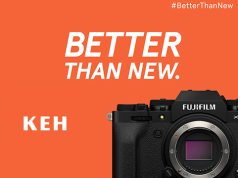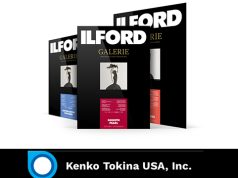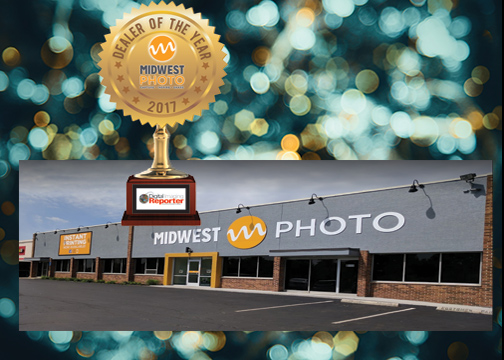
A family-owned business with traditional values, Midwest Photo has thrived by embracing change and focusing on relationship building.
“He’s like a rock star. Customers would flock to the trade show booth just to talk to Stu.” Industry veteran Mark Mohler spent 15 years in the Ohio retail photo industry before joining Midwest Photo in 2009. Midwest came on the industry’s radar screen when they went coast-to-coast selling cameras, lighting gear and accessories at up to 50 trade shows a year. The story of Stu Appelbaum and Midwest Photo starts like most great inventions—from necessity. 
In the late 1970s, Appelbaum was a starving grad student with one difference—he had a family to feed. He sold his camera when he saw a chance to make a profit. He bought another camera and soon resold that, again at a profit. A light bulb went off; Appelbaum determined he could supplement his Ohio State University graduate assistant income by selling used photo equipment.
That plan grew into buying and selling equipment from his basement. His son Moishe remembers coming home from school and packing up the day’s orders. Through pre-Internet magazines, Appelbaum was able to “arbitrage” different markets, buying lower in one to resell higher in another. At the time, international currency fluctuations created opportunities for Midwest Photo to buy used cameras from Japan and sell them in Germany—and reverse the process when currencies shifted.

Eventually, Appelbaum opened a small retail shop located just up the street from his home. However, it was a sub-par retail location.
Trading Up
As the business grew, Appelbaum found a spot closer to the university for the same rent. Parking was tight, but the business grew as out-of-town trade shows were added to the mix. These shows featured Appelbaum in the booth with other Midwest Photo team members. The customers got to know him. Many would come by the booth and say, “I want to talk with Stu.”
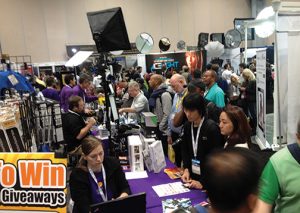
Midwest launched its own lighting line, LumoPro (LumoPro.com) in 2007. It got a huge jump-start when Appelbaum became involved in the Strobist community forums and started answering users’ questions about lighting gear. With the help of David Hobby (Strobist.com), Midwest used this forum to crowdsource its first flash, which LumoPro released in 2009. It was tailored for off-camera flash users with the exact bells and whistles the Strobist community wanted, nothing more. Peter Biasotti, former CEO of Calumet Photographic, and Chris Harlocker were also instrumental in the brand’s creation.
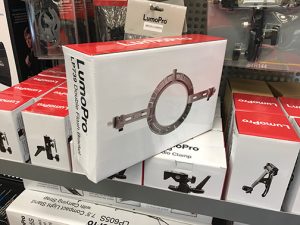
“It was a case of striking when the iron was hot,” Moishe Appelbaum says. “I can’t imagine trying to create a brand from the beginning today. We found a hole in what was becoming a large market that wasn’t getting the attention it deserved. To this day, LumoPro puts a strong focus on tailoring products to the off-camera flash community. LumoPro is adding more North American retailers to established resellers in Europe, the Mideast, Asia and also Australia.”
When customers started using the Internet for buying, business shifted. Customers weren’t waiting until next year’s show to buy from Midwest; they called Stu Appelbaum instead. As the web got more reliable, those calls fell off.
The Next Generation Steps Up
Another shift for Midwest was Moishe Appelbaum’s involvement in the business. He had been involved in establishing the LumoPro brand and supporting the nationwide trade shows. An active photographer, he understood his customers’ frustrations. He also saw the shifts in the trade show business while those costs were climbing.
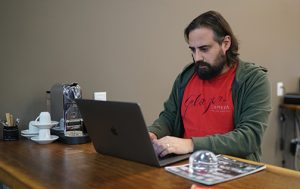
Stu Appelbaum reflects on this time in Midwest’s history with pride. “We worked well together. Moishe started at a young age to work with me and he worked hard. He had a youthful attitude, which helped him underestimate the amount of effort required to make things work. When he fully took over in 2014, he completely understood the time, effort and passion that would be needed. He was ready to take it on with his whole heart and full commitment. We h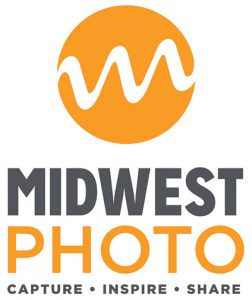 ave differences from time to time, but we have mutual respect so those differences aren’t overblown.
ave differences from time to time, but we have mutual respect so those differences aren’t overblown.
“At some point, I realized you need a single person at the head. Someone who understands the business and leads it. Today, Moishe is the one staying up at night worrying about keeping all 30 employees’ mouths fed, and their families’ mouths too.
“Moishe is the one who signs for the loans. It’s unlike any employee. Employees are paid by their worth in the marketplace and what the company can afford. The owner has responsibilities of ownership that remain 24/7,” Appelbaum explains.
Diversification and a Different Focus
As the reins passed from father to son, it was evident shows weren’t working as they once did. They generated significant sales volume, bringing marketing support and volume incentives from manufacturers. But even with those extra financial contributions, the low margin on cameras and lenses couldn’t cover operating costs.
Moishe Appelbaum recognized the need for diversification and a different focus. He reflects, “As the Internet grew, customer loyalty took a big hit. Even our best customers across the country fell off. People would come to the shows, shop for the deal and go back to their regular shopping habits the rest of the year. The opportunity costs of doing the shows just became too large.”
The Columbus, Ohio, store on High Street was cramped and disorganized due to tight space and the staging areas needed for the shows. Having joined the PRO buying group, Appelbaum listened to the success leading retailers were having with classes. When a nearby store became available, he turned it into the Midwest Learning Studio.

Moreover, as the company focused on the local market, parking and space became significant issues. Appelbaum found a large building to rent with fantastic parking, along with freeway visibility and access. It was three times larger than the space they’d been occupying for 22 years. He grabbed it. It took only eight months, from lease signing through permits and remodeling, to open—an impressive performance by the Midwest team. The grand opening of the new dream store was held in summer 2016. Appelbaum says, “One thing that I learned from dad—and that I really truly believe—is one of the main reasons we’re still in business is you’ve got to change, and you’ve got to keep changing.”
The New Midwest Photo
The “wow!” factor for first-time new store visitors is palpable. There’s no doubt why the company has become the region’s leading camera store. The building is designed to showcase each of Midwest’s departments, making them clearly visible to shoppers.
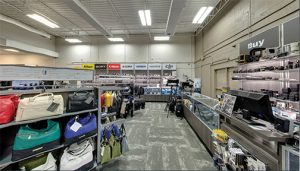
In addition, after the importance of trade shows eroded, Appelbaum felt even more diversification was needed. Today, the company is active in used, rental, LumoPro, cameras and hardware, education, commercial sales as well s third-party website sales. Moreover, service offerings include sensor cleanings and photo printing. The signage is bold. The products are well lit. The displays are massive and focused.
Despite Columbus being home to two other full-line camera specialty stores, Appelbaum doesn’t consider them his main competition. The local competition is Amazon, and sometimes Best Buy. Specialty retailers have programs and events to grow the
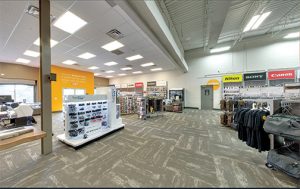
photographic market and build community. Appelbaum believes strong specialty retailers grow the pie for manufacturers as well as retailers.
The Benefits of Industry Groups
The influence of various PRO group members on Moishe Appelbaum’s decision-making process is huge. He believes the new store wouldn’t have happened without suggestions and guidance from people like Joe Dumic (B&C Camera, Las Vegas, NV), Rebecca Kaplan (Glazers, Seattle, WA), Mark Leonard (PRO COO), Jerry Sullivan (Precision Camera, Austin, TX) and Jennifer Waicukauski (Looking Glass Photo, Berkeley, CA). He learned from Sullivan it’s easier to generate a higher gross margin in a better-looking, well-displayed store. When customers can see and experience products, sales and margins increase.
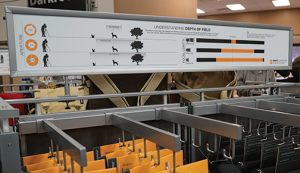
“It’s common sense,” Appelbaum notes. “We were in an old, cramped, dark, inefficient store. We knew we had to change. It was a big change the entire team had to embrace. Midwest is fortunate to have rock stars on our team. Everyone is passionate about our future. It’s not about the building or the build out. It’s about the fact Midwest is investing in our future for better customer experiences.”
Appelbaum is very definite about the advantages of belonging to industry groups. “Having industry groups is really important. PRO is a buying group of specialty imaging retailers, and we value that relationship. The Imaging Alliance (TIA) is an industry group that brings vendors and sellers together to promote imaging.”
Midwest has been a member almost since TIA’s first day. The alliance sponsors Portraits of Love, which Midwest passionately embraces on a local level. To photograph families and pets of military personnel, Midwest converts their Learning Studio into a full-blown portrait studio. Moreover, the annual event has been a great avenue for employees and the company to thank military families. The PoL event has some small economic benefit beyond giving back. It generates store visits from people new to the area who may not have known Midwest existed.
Perspectives on Marketing
“One great takeaway from a PRO convention is: If all you talk about is price, how can you be mad when the customer finds it somewhere else cheaper? Be more than price! Be compelling with your entire offering,” Appelbaum asserts.
While there’s no criticism of the Buy Local movement, Midwest doesn’t promote it. “It sounds like since you’re not giving value, you need to ‘guilt’ people into buying from you because you’re local. Midwest offers solid value the customer should be able to see. When they come into the store, they’ll understand we’re local and why that’s important.”
The Film Menu
Moreover, Midwest does all the electronic marketing possible: e-mails, blogs, YouTube, Facebook, Pinterest, Twitter, etc. Yet Appelbaum also invests substantial resources into printed materials. The Midwest print philosophy is simply superb design, produced by Moishe’s brother, Josh Appelbaum, along with Ken Lewis and Michelle Dean. Printed sales-building tools include a totally unique Film Menu. It’s worth a retailer’s time to review this distinctive piece to understand just one tool Midwest uses to shape its personality in the marketplace.
The Film Menu’s cover blasts “Film Is Alive and Well.” The inner pages mimic a fine restaurant menu, offering films like Kodak’s Tri-X, described as “Time-tested, classic monochrome, just like grandma used to shoot.” Or Fujifilm’s Superia 400: “Pleasant, earth umami with lightly toasted crumbles of grain.” Besides calling attention to their myriad film offerings, the publication establishes the personality of Midwest Photo. A customer won’t find anything like the Film Menu at other stores. It screams seriousness about imaging, while not taking themselves seriously. Don’t you love to shop in such a place?
A Focus on Education
While most retailers hold their classes online, Midwest publishes a spectacular Learning Studio catalog. Why use print when soft display is supposed to be the only acceptable media today? Attribute it to Appelbaum’s genius.
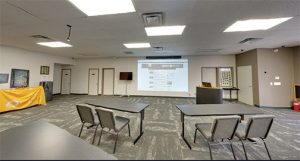
“When a customer knows exactly what they want, they search for that online. Most people don’t know what we offer in rental or classes, so they can’t search for what they don’t know. We have detailed print catalogs of these offerings. The customers turn the pages and make their own discoveries. We have the same information online, so if the customer knows specifically what they want, they can find it in both places. The printed catalogs drive sales of new products or products that the customer didn’t know we offered.
“When customers ‘discover’ these jewels on their own, then they become more engaged with us. We try to ensure every new customer gets our Learning Studio catalog and Rental catalog. Customers tell us once they start turning the pages, they can’t stop reading until the end. That’s what good graphic design does for printed advertising.”
Relationship Building
“We invest in marketing, so when a customer googles or searches for a photographic product in our market, they will find our website,” Appelbaum explains. “We want the customer to be able to search and find what they are looking for on our site within seconds. The price should be competitive and the product should be in stock.
“We have live chat capability where we will proactively engage up to three customers at once in three independent, simultaneous live chats, asking if they have questions or need information. We use live chat to confirm what we have available, ask what the customers are looking for and also ask if they would like us to hold the product for pickup. If the customer isn’t buying or has a concern, the chat operator has the authority to adjust shipping costs or do whatever is reasonable to help the customer buy now.
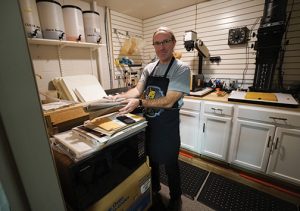
“We get a loose commitment about when the customer will be in the store, either to pick up the product or evaluate it,” Appelbaum continues.
“The customer arrives to find easy parking in a clean lot and a friendly greeting at the front door. They are offered espresso. They are engaged with a sales representative who helps them find exactly what they need while building a relationship. Depending on the product purchased, they are given a free class and a free rental certificate. When feasible, we book their free class and free rental as applicable.
“The customer returns for these and continues the relationship with the store and sales representative,” adds Appelbaum. “The customer becomes a rabid fan of Midwest, posting positive reviews and encouraging friends and family to visit Midwest.”
The Company Culture
When Mark Mohler joined Midwest, he was hired by Stu Appelbaum and now happily works with Moishe. He says, “Moishe uses ‘wise aggression’ to accomplish his goals. He doesn’t lie back and hope things will happen. There is no corporate mold that we are asked to conform to. We all have personality traits that make us who we are. When those individual strengths come together, you have the complete picture of the culture that is Midwest Photo.
“Moishe aggressively and wisely focuses on his goals. Employees are number one on his priority chart. He walks the talk when he says employees are the company’s most important asset,” Mohler reflects. “With the team here, we are who we are.”
Appelbaum adds, “I pray to have and maintain a diverse staff. The environment has to be comfortable for anyone. We refuse to accept intolerance or harassment of any kind.”
Hearing from the Staff
Ken Lewis, Midwest’s vice president, is a big fan of its Front Line Discussions. These are weekly meetings where the employees speak to management. The prime focus is on what the team needs. It covers good news, bad news as well as what’s new. It’s not a time for management to lecture. It truly is a time for management to hear what’s happening and to listen.
You hear a lot about people and team at Midwest. TJ Hansen started in 2012 after a career in hospitality. “Midwest was stable. It allowed me to grow as a person and a photographer,” he says. “There is an environment that allows me to depend on Midwest as a family. I know that’s a cliché. With 30 employees, it could start to feel corporate, but Moishe won’t let that happen. His door is always open. Midwest has the structure to be a successful business but is flexible and engaged enough to constantly urge me to use my talents, expertise and passions to be an individual. I’m buying my first home because of what Midwest has made available to me. I was a customer here and knew it was the kind of place where I wanted to be.”
Midwest has low employee turnover. A sure way to get fired is to make another employee’s job more difficult. The team’s mantra is: “How can I make your job easier?” It recognizes that frustrations and difficulties make customer service harder, while increasing team burnout or turnover. The impacted employee translates team-induced stress as a lack of caring on the part of the organization, which becomes self-defeating. Midwest’s goal is to find the best people as well as to create an environment where they want to stay and be productive.
The Philosophy
When asked what he wishes he’d known when he took over the business, Moishe Appelbaum ponders before answering. “Finance and accounting. They’re more complicated than I thought, and the cash flow pressures are greater than I knew. It’s one area my dad and I didn’t talk enough about. It has changed so much since he started. I have to be more aware of cash flow and gross margins than he ever did. It’s not as easy as it used to be.
“If you want to be rich, don’t follow my lead. I have a comfortable but modest life with what I believe to be a pathway to the same comfortable but modest retirement, and with a legacy for my daughter,” he adds. “At the same time, I’m not working 70 hours a week and missing my daughter growing up. Or being so stressed I miss out on my life right now. I expect the same from my employees.”
One quote he has been thinking a lot about lately is, “Computers aren’t the thing, they’re the thing that gets us to the thing.” For Moishe Appelbaum, Midwest Photo gets his community as well as his team to “the thing,” which includes among many others: stability, a home, an earth-changing photograph, a friendship, a stable living and the creation of memories.
The Staff at Midwest Photo
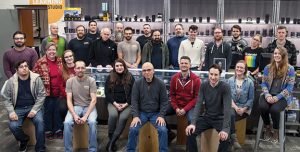 Midwest Photo’s team. From left to right, 4th row (top): Ken Lewis, Mark Mohler, Troy Hildebrand, Sonnie Jones, Tom Wright. 3rd row: Andy Hoppe, Scott Shambaugh, Jim Andracki, TJ Hansen, Moishe Appelbaum, Mat Marrash, Andrew Clark, Sara Shevchik, Jacob Smith. 2nd row: Umair Jangda, Marty McCutcheon, Katie Sule. 1st row: Joshua Appelbaum, Ricky Gipson, Michelle Dean, Bill Schwinn, Matthew Dyer, Adam Slane, Annie Patton, Kristen Davis. Not pictured: Anna Dobbs, Tony Shumski, Casey Stewart, Grace Becker, Fred Quarcoo, Janae Miller, Spencer Lookabaugh. Photo by Spencer Lookabaugh
Midwest Photo’s team. From left to right, 4th row (top): Ken Lewis, Mark Mohler, Troy Hildebrand, Sonnie Jones, Tom Wright. 3rd row: Andy Hoppe, Scott Shambaugh, Jim Andracki, TJ Hansen, Moishe Appelbaum, Mat Marrash, Andrew Clark, Sara Shevchik, Jacob Smith. 2nd row: Umair Jangda, Marty McCutcheon, Katie Sule. 1st row: Joshua Appelbaum, Ricky Gipson, Michelle Dean, Bill Schwinn, Matthew Dyer, Adam Slane, Annie Patton, Kristen Davis. Not pictured: Anna Dobbs, Tony Shumski, Casey Stewart, Grace Becker, Fred Quarcoo, Janae Miller, Spencer Lookabaugh. Photo by Spencer Lookabaugh
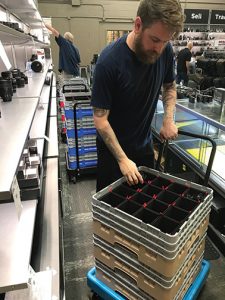

Midwest’s Unique Personality
♦ Some stores offer free coffee. Midwest offers espresso.
♦ Black Friday sounds morbid. At Midwest it’s “Black and White Friday.”
♦ Rather than Vendor Days, Midwest has Feature Fair.
♦ Cyber Monday is Cyborg Monday, giving graphic artists more to work with to create that Midwest difference.
♦ Drone sales are 40% selling the drone, 60% setup. Midwest offers drone setup for a fee, like a class. Customers appreciate it.
♦ Weekend rentals are billed at one-day rental rates if picked up on Friday and returned anytime Monday.
♦ Midwest helped create the Camp Click program. Customers donate old cameras for a middle school photo class. The kids are taught photographic basics and how to express themselves through film. After the six-week program, they keep the cameras. Midwest exhibits the students’ work. Students are also able to continue their photographic education at Midwest with free classes.
♦ For inventory Midwest doesn’t want to put any more effort into liquidating, its Dig for Your Deal lets the “digging” customer find treasures among the inventory dregs. This generates more cash/traffic than listing a hundred lines of gear in a data dump.
♦ Northstar Restaurants in Columbus operates numerous restaurants. Every restaurant has commonality in its attention to detail and customer service. Their employees serve customers with true joy. Appelbaum takes Midwest employees there to experience service the way he expects it to be delivered. Nothing like real life experience to train people!
♦ A black & white darkroom gives Midwest “street cred,” Ken Lewis tells us. “The smell takes old-time photographers back in time and also introduces new visitors to film. The most common question people ask is ‘How much film do you sell?’ That starts our favorite conversation.”





